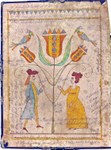 |
|||||||||||
|
|||||||||||
Johann Conrad Bloss and Anna Magdalena Reber |
|||||||||||
Germany |
|||||||||||
|
“Remember, remember always, that all of us, and you and I especially, are descended from immigrants and revolutionists."
― Franklin D. Roosevelt |
|||||||||||
|
|||||||||||
|
Johann Conrad Bloss and Anna Magdalena Reber married on November 30, 1740 in Germany. Conrad was a weaver.
They emigrated from southern Germany. They sailed from Rotterdam on the ship Francis and Elizabeth, commanded by Captain George Worth, and landed at Philadelphia on September 21, 1742. John George Bloss was born on October 15, 1744. Maria Margaretha Bloss Brandstetter was born about 1750 in Pennsylvania Eva Elizabeth Bloss Seidel was born about 1755. Their other children include Daniel Bloss, Peter Bloss, Henry Bloss, Sonia Bloss, Conrad Bloss. October 4, 1749, Conrad took out a warrant for twenty-five acres in Bucks county, which is now in Lehigh county. On May 30, 1750, he took out a warrant for fifty-six acres and thirteen perches called Issenberg. The first official act in recognition of Heidelberg as a township was made at the October term of court 1752, when Conrad Bloss was appointed constable. The Heidelberg Union Church was burned in Indian attacks In 1757, fifty six families contributed to the new church, including Conrad Bloss. On May 9, 1765, he purchased from John Engel Thomas a tract called Manheim, which was taken out by a warrant dated October 19, 1757, for 139 acres. On April 9, 1767, he purchased from the heirs of Jacob Shellhammer a tract called Berlin of fifty-eight acres. The last three tracts were in a patent that was granted April 10, 1767 to Conrad Bloss by Thomas Penn and Richard Penn. On August 25, 1765, he made application for twenty-five acres and in pursuance of warrant number 623 dated August 14, 1766. On August 25, 1766 he was granted a tract of twenty-five acres and fifty perches called Schwabenstadt. Another warrant was taken out for twenty-eight acres and thirty-two perches on August 14, 1766. The total land he owned amounted to 331 acres and ninety-five perches. In the Proprietary Tax List of 1772, Conrad Bloss, farmer, was assessed one pound and four shillings. In 1776 a Conrad Bloss participated in the Battle of Long Island. Since Conrad, Sr. would have been 60 at the time, it is unlikely that he marched to New Jersey. The Conrad could have been his son or nephew. In 1781 the Heidelberg Church listed Magdalena as a widow when she was the sponsor for her granddaughter and namesake. The 1790 census listed "Lanah Plose" as a widow in Heidelberg township. Magdalena Bloss lived with her son-in-law, Peter Seidel, five years before she died. Magdalena died in 1803 when she was about 77 years. Peter Seidel was appointed administrator of her estate, August 8, 1803.
|
|
|||||||||
|
|||||||||||
|
©Roberta Tuller 2023
|
|||||||||||

